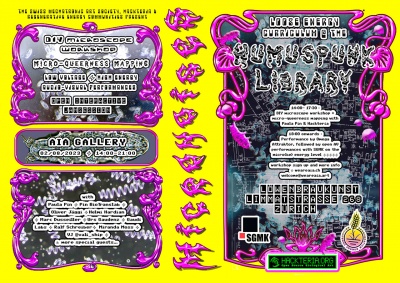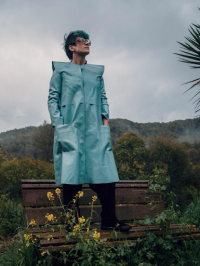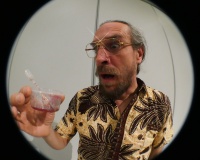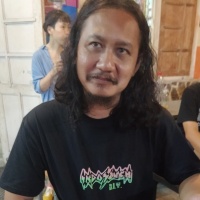Micronoises - microqueering
Contents
Description
In connection with nature, we fall in love with the earth and are curious about its inhabitants. We investigate who is native and who is an invasive species to understand the complexity of the place. Of course, this leads to wanting to know who has cared for the earth since time immemorial. Who evolved with this earth and formed and formed this bioregion? When we begin our journey towards connecting with nature must include this, because this deletion is harmful. When you uproot a land culture that has evolved with the land for ages immemorial, the trauma is immense not only for people, but also for their more than human community. How the uprooted land microcultures affect the terrain and how all the microorganisms fight to survive when the humans make inferences on the land? how these facts also affect the ecosystem and humans on a feedback loop.
Mapping queerness is an exercise to compile as much as we can about the microscopic entities and look for how the forces and interactions between microorganisms are moving the cooperation as horizontal gene transfer of information, just following the rules and the behaviors of bacterias as we learn from each other.
Related with the exhibition Regenerative Energy Communities we will love to explore the effects of the big eolic parks into the microbiota of the lands where they are installed in order to explore how these big parks destroy the micromacro ecosystem.
More information and links
This workshop is based on a text I wrote a decade ago that was related to all the things I learned at that time. Just looking for Queer Nature on the internet opened up the new window of feminist quantum envisions from Karen Barad and her wonderful text Nature Queer Performativity.
If you want to follow up what I was writing you can check here on BioSensing blog FotoSyntetika. energy that matter, noises that are micro and entities that are queer exploring the emergence, resilience and autopoiesis. https://biosensing-blog.tumblr.com/post/22474992053/transferencia-horizontal-de-genes
Reading materials:
The biodiversity ‘outsiders’ - the protist gang What does biodiversity mean to you? The common focus is the loss of rainforests and wildlife conservation, but what about the lesser known, microscopic species?
Nature is queer—and we should embrace that!
Queer Mycology
Queer Love, Gender Bending Bacteria, and Life after the Anthropocene
Surviving in cold environments: from microbes under glaciers to queer scientists in the current social context
Schedule and Location
Start: 14:00
Duration: approx until 17:30
All participants are invited to join the evening event with performances and jam-sessions using the ouputs from the Workshop and other gear that will be provided
Location: WEAREAIA exhibition space, Löwenbraukunst, Limmatstrasse 262, Zürich
The Workshop is part of the Energy Giveaway / HumusPunk Library Loose Energy Curriculum hosted in the exhibition space from WEAREAIA.
About the Mentors
Mentor: Paula Pin (Spain)
Paula Pin (Lugo/Spain, 1982) is a Transhackfeminist performer and researcher which has a strong inclination towards research and experimentation processes with collective and free technologies. The experimental process of incorporating noise into the body leads to experiment with synthesizersoften including DIY DIWO Trans-tech body in performance. In 2011 carries out the process Photosinthetika, gender- tech-nature hybrid extension agencies to reappropriate knowledge of bio-political tactics and generate technological autonomy. Currently he dwells the transhackfeminist laboratory Petchblenda; The Lab experiments in bio-electro-chemical aspects with a Biopunk Biosophy, prolific research and bio-political practices.
My active participation in the lab Pechblenda and Transnoise, besides my social ideals and my workas a noise performance and workshopologist, has taken me to many spaces and contexts, specially to the point of starting to collaborate in 2012 with Hackteria, a Biohacking network. Open up again the opportunity to give up workshops as a facilitator all around the world always putting the focuson spread the knowledge and share experience over a transfeminism horizontal perspective.
The last year, after bio and transhackfeminist values I have been designing and fabricating the devices for a Mobile Lab developing a line of hardware (HardGlam) for Biotranslab project that is used for autonomous gynecology practices and investigation. As my knowledge in electronics is based on open source and DIY, the devices included in the laboratory are portable replications of a microscope, a speculum done with a 3D printer, an incubator, PCR, centrifuge ...
Plants, microorganisms and other sources of alternative energy, resulting in a complex web of interactions that fuses transversely machines and plant and animal organisms with the cosmos, and reveals a transhackfeminist queer ecology.
Assistant: Marc Dusseiller aka dusjagr (Coconut Island)
Marc Dusseiller, Center for Alternative Coconut Research & member of Hackteria
Dr. Marc R. Dusseiller is a transdisciplinary scholar, lecturer for micro- and nanotechnology, cultural facilitator and artist. He performs DIY (do-it-yourself) workshops in lo-fi electronics and synths, hardware hacking for citizen science and DIY microscopy. He also loves coconuts. He was co-organizing Dock18, Room for Mediacultures, diy* festival (Zürich, Switzerland), KIBLIX 2011 (Maribor, Slovenia), workshops for artists, schools and children as the former president (2008-12) of the Swiss Mechatronic Art Society, SGMK and co-founder of the new Hackerspace collective Bitwäscherei (2020) in Zürich. He has worked as guest faculty and mentor at various schools, Srishti Institute of Art, Design and Technology (IN), UCSB (USA) and in Switzerland, FHNW, HEAD, ETHZ. In collaboration with Kapelica Gallery, he has started the BioTehna Lab in Ljubljana (2012 - 2013), an open platform for interdisciplinary and artistic research on life sciences. Currently, he is developing means to perform bio- and nanotechnology research and dissemination, Hackteria | Open Source Biological Art, in a DIY / DIWO fashion in kitchens, ateliers and in the Majority World. He was the co-organizer of the different editions of HackteriaLab 2010 - 2020 Zürich, Romainmotier, Bangalore, Yogyakarta and Klöntal, Okinawa and collaborated on the organisation of the BioFabbing Convergence, 2017, in Geneva and the Gathering for Open Science Hardware, GOSH! 2016, Geneva & 2018, in Shenzhen.
- http://hackteria.org
- http://www.mechatronicart.ch
- http://openhardware.science
- https://www.bitwaescherei.ch/
- http://www.randelab.ch
Workshopologi Observer: Helmi Hardian (Indonesia)
Helmi Hardian is a grassroots artist and ghetto scientist, with a specific interest in cooking and smoking at the same time. He lives in Surabaya, the city that is well known for its industry and technology, as well as being the center of electronic component trading (chiefly, Pasar Genteng). Hence, almost all of his works are closely related to science and technology as the medium of creativity. He is the co-founder of Waft Lab, a creative-based initiative that works at interdisciplinary practices. Currently, he focuses on tech development through DIY/DIWO culture and playing his role in researching, hacking, or deconstructing daily materials to provide some devices with new functional aspects, as well as developing workshop kits, lecturing contents, and presentation materials, which aim to learn, share, and exchange knowledge.
He is currently a guest in the MechArtLab as a "Hacker-in-Residence" for the BIR residensi



